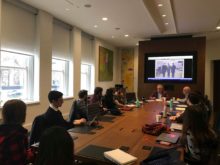By Yukon Damov, CERES MA candidate
April 22, 2018
Just two weeks after an international scandal broke involving the communist-era collaboration of a prominent French-Bulgarian thinker, a leading Bulgarian expert on state security, Dr. Momchil Metodiev, made a timely visit to Toronto to deliver two lectures at the Munk School of Global Affairs.
In early April, a story from his small East European country captured the attention of the New York Times, Reuters, and The Guardian. It involved Julia Kristeva, linguist, psychoanalyst, feminist, and an author of more than 30 books whom the Times called “one of Europe’s most decorated public intellectuals.”
Kristeva emigrated to France in 1965 at age 24 and quickly became established among a circle of Parisian post-modernists including Jacques Derrida and Jacques Lacan.
According to the file published online by the Bulgarian Dossier Commission, which is responsible for reviewing the state security archives, she was recruited as a spy in 1971 and provided information to the Bulgarian state until 1973.
Kristeva vehemently denied the report, calling it a “baldfaced lie.” The case, and her response, has highlighted the key role of opening the archives for transitional justice, their political sensitivity, and the need for sober, non-partisan research into the archives by Bulgarian academics such as Metodiev.
In Toronto, Dr. Metodiev joined a chorus of prominent Bulgarian scholars in accepting Kristeva’s collaboration as true, but mitigated the importance and the shock of the scandal. As a well-connected public figure whose family remained in Bulgaria, she would have made a prime target for Bulgarian foreign intelligence because the security or well-being of her family could be used against her. He also qualified the significance of her collaboration because the information she was shown to have provided was benign and she was a spy for only a short time period.
Kristeva’s supporters complain that there is a conspiracy against her, which is not an abnormal reaction in a situation where recent history is politically charged and shrouded in secrecy. The opening of the state security archives in 2007 have gone a long way toward allowing researchers like Metodiev to improve the accuracy of Bulgaria’s collective memory.
Along with his colleague, Maria Dermendjieva, Metodiev traced the deleterious impact of the communist-era state security’s culture and its personnel on Bulgaria in the early transition phase.
The archives’ opening enabled Metodiev to investigate the biographies of many of these state security officers and to explore the culture of an organization that remained relatively intact through the transition.
Metodiev’s conclusion about the state security personnel is that they were “mediocre people with mediocre worldviews.” It is the sort of statement one can make about an organization that is shown to be as anti-meritocratic as Metodiev presented Bulgarian state security to be.
His working (and fair) assumption about an organization whose function was to protect the regime was that state security would be comprised of Bulgaria’s best and brightest people. As he and Dermendjieva scrutinized the files, they found that in fact the leading requirements for employment and advancement were political loyalty to the Communist Party and family background. Education levels and second-language knowledge were relatively poor up to the end of the communist period, despite growing professionalization of the organization.
After the end of communism, Bulgaria chose to pursue a peaceful transition by avoiding, for the most part, purging former communist state police. Instead, the most repressive officials were dismissed while structural re-organization was designed to engender loyalty to the new regime. There was much continuity within the state security apparatus, yet their files remained closed for 17 years.
The troubling legacy of this mediocre culture, Metodiev argued, is that its anti-meritocratism became institutionalized in the new state security apparatus and beyond during the early transition period. Former state security officials preserved their networks with secret collaborators (enabled by the still-closed archives) and their former colleagues within state security; they often joined government as “technocrats” or “experts”, and ran companies created by the state under communism or that they themselves created post-1989 due to their well-connectedness.
Metodiev’s research supports the theory posited by Bulgarian political scientist, Venelin Ganev, who argued that a “predatory elite” preyed on the state in the 1990s.
For Metodiev, Bulgaria’s further integration into the European Union and the arrival of Western companies will encourage a more meritocratic culture in Bulgaria’s institutions.
Dr. Metodiev was invited to the Munk School as a part of the Distinguished Leaders of Bulgaria Series, co-sponsored by the Centre for European, Russian, and Eurasian Affairs, and Mr. Daniel Damov and his late wife Elisabeth Damov (Disclosure: The author of this article is their grandson).
With notes from Eilish Hart.
